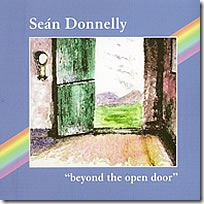 [1]
[1]
Review
By John Paddy Browne
You know what to expect when you get a new Sean Donnelly CD. There will be a selection of unpretentious, straightforward songs, some of them traditional, some of them of Ulster lineage, most of them Irish. There will be a small band of musicians playing unobtrusively but with mesmerising effect behind the singer. And there will be the singer himself with his distinctly north of Ireland enunciation, quiet, unshowy, almost diffident. He uses an open-tuned guitar, which means that his accompaniment forms a lacework pattern of arpeggios, accented and held together by the rich bass of the bottom string as it keeps time. I don’t know anyone else in folk music who uses a guitar so delicately.
Returning to form after a lengthy hiatus from the recording studio and from personal appearances following the tragic death of his son Michael in a freak accident in 1998, Sean Donnelly has put together a characteristic dozen tracks of mixed vintage. There are a couple of old-time songs, Carrickdown and My Own Gweebarra Bay; a ballad about the loss of Lord Franklin on his voyage to find a passage through the Hudson Bay; a former pop-song, The Isle of Innisfree, and a couple of his own songs and those of his contemporaries.
He slips seamlessly from one song to the next, imbuing each with the illusion of antiquity, as though the entire repertoire had come down to us from the mouths of old singers passing down an ancient heritage.
In a lesser singer this might give rise to a charge of reducing everything to a common level; but what Donnelly does is to bring a freshness to songs that we may have discarded because of over-familiarity or because the songs may have suffered from such a flaw as sentimentality -no longer an attraction to modern audiences. Hence, a song like The Isle of Innisfree, once ingratiatingly crooned by Bing Crosby (and enormously popular, it must be said) now takes on the mantle of a true folk song, and anyone who had never heard the commercial version back in the 1950s might easily mistake it for an old come-all-ye as Sean Donnelly breathes new life into it. The sentiment is there but not the sentimentality.
At the other end of the folk spectrum would be the more substantial Lord Franklin, with its much-used tune (The Croppy Boy, The Newry Highwayman, etc). Usually performed as a full-blooded panegyric on a heroic venture gone wrong, Donnelly delivers it as though he were reporting a piece of bad news, stripped of the mode of the epic ballad, and rendered as a come-all-ye. Placing My Own Gweebara Bay (a real come-all-ye which is still well known in Donegal) right after Franklin shows up some of the limitations of the come-all-ye style: the two tunes and the rhythms are very similar, and are reminiscent of dozens of other songs in that particular genus.
And, as though to consolidate the argument he follows Gweebarra Bay with a touching little song called Sweet King Williams Town, relating the story of a man who survived the Titanic disaster only to be killed as an American soldier in World War One.
Denny Lane’s 19th century soliloquy on the 17th century "Flight of the Earls” is a
lyrical song beloved by generations of Irish sopranos. Sean Donnelly breaks that particular tradition by singing it, not as an extravagant and florid "big song", but again as a humble come-all-ye through which the heart-breaking lyrics still echo:
Soft April showers and bright May flowers
May bring the summer back again,
But will they bring me back the hours
I spent with my brave Donal then?
And then there are Donnelly’s own songs. Here he treads carefully on dangerous ground. Songs about family and friends are notoriously difficult to write without teetering over the brink into sentimentality, but I think that he keeps a couple of feet back from the edge. The song for his lost son is genuinely moving (At the End of the Day) and he avoids those excessive vocalisations that often make such songs so unpalatable. Having said that, I could have done without the spoken lines in an otherwise tender song From Fawney Cross to Picquingny, which relates a journey undertaken by a man visiting a World War One cemetery.
In all of this Sean Donnelly is blessed by a small selection of very able musicians who make their mark on his songs yet keep their distance, so that he is never overshadowed by them. The flute of Brendan Monagan and Plunkett McGartlan’s fiddle are particularly sensitive and add greatly to Donnelly’s performances. All the musicians in their ways are partly responsible for the almost hypnotic quality of these recordings. Allied to Donnelly’s quiet story-teller’s voice, they make what looks like a routine dozen-track album anything but routine: they make it memorable.
——————-
JPB
26 March 2008